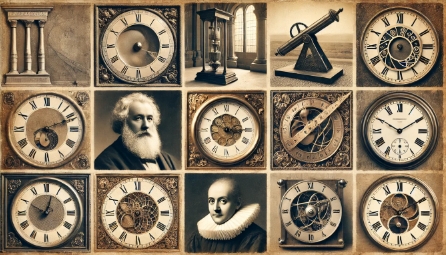
Los relojes de pared han sido durante mucho tiempo más que simples herramientas para medir el tiempo: son reflejo de la creatividad humana, la innovación tecnológica y el gusto cultural. Desde los primeros dispositivos mecánicos hasta los elegantes diseños modernos que adornan los interiores actuales, la historia del reloj de pared es un auténtico viaje a través del tiempo.
La historia de los relojes de pared comienza con los primeros intentos de la humanidad por medir el tiempo. Las civilizaciones antiguas utilizaban relojes de sol, de agua y de arena para registrar el paso de las horas. Estos primeros instrumentos sentaron las bases de las innovaciones mecánicas que se desarrollarían en Europa siglos después.
Hacia el siglo XIV, comenzaron a aparecer relojes mecánicos de torre en iglesias y plazas de toda Europa. Estos relojes monumentales, a menudo accionados por pesadas pesas y engranajes, marcaron el inicio de la era de los relojes mecánicos.
A medida que avanzaba la relojería mecánica, los artesanos comenzaron a crear relojes más pequeños y precisos para los hogares. En los siglos XVII y XVIII, los relojes de péndulo se convirtieron en símbolos de estatus y precisión. La introducción del diseño de pared permitió a las familias disfrutar de una medición precisa del tiempo sin ocupar un valioso espacio.
Marcos de madera, tallas ornamentadas y péndulos de latón caracterizaron estos primeros relojes de pared, que a menudo eran preciadas reliquias familiares que se transmitían de generación en generación.
El siglo XIX trajo consigo la Revolución Industrial, que transformó la relojería para siempre. Fábricas de Europa y América comenzaron a producir relojes de pared a gran escala, haciéndolos asequibles y accesibles al público.
Innovaciones como el movimiento de resorte y los métodos de fabricación mejorados permitieron relojes de pared más delgados, ligeros y fiables. Esta época también introdujo el concepto de hora estándar, vinculando los relojes al ritmo de la vida moderna.
En el siglo XX, los relojes de pared evolucionaron más allá de su mera practicidad y se convirtieron en piezas esenciales del diseño de interiores. Los movimientos Art Déco, Bauhaus y Modern de mediados de siglo inspiraron formas geométricas elegantes y una estética minimalista. El plástico, el metal y, posteriormente, el acrílico dieron a los diseñadores la libertad de experimentar con el color, la textura y la forma.
La tecnología eléctrica y de cuarzo revolucionó la medición del tiempo una vez más, ofreciendo una precisión casi perfecta y un funcionamiento silencioso. El reloj de pared se convirtió no solo en un elemento esencial del hogar, sino también en una expresión de gusto, cultura y personalidad.
Hoy en día, los relojes de pared siguen combinando tradición e innovación. Los diseñadores experimentan con materiales como Madera, acabados en mármol, aluminio y acrílico transparente., al tiempo que incorpora funciones inteligentes como Pantallas digitales, carga USB y sensores de temperatura.
En VirtueTime / Relojes TongyuanHonramos este largo legado creando relojes de pared modernos que combinan belleza estética con precisión confiable. Nuestras colecciones incluyen todo, desde estilos clásicos de cuarzo a diseños creativos inspirados en el arte, garantizando que cada reloj agregue tanto función como carácter a cualquier espacio.
Desde péndulos hasta cuarzos, desde intrincadas tallas de madera hasta minimalistas marcos metálicos, los relojes de pared siempre han reflejado el deseo de la humanidad de equilibrar forma y función. Cada tictac representa progreso, un recordatorio de que, aunque el tiempo avanza, la artesanía y la creatividad permanecen atemporales.
Para descubrir tu propio pedazo de historia, explora Colecciones de relojes de pared modernos y clásicos de Tongyuan Clock —donde el diseño, la precisión y la tradición se unen maravillosamente.
Visita: www.tongyuanclock.com